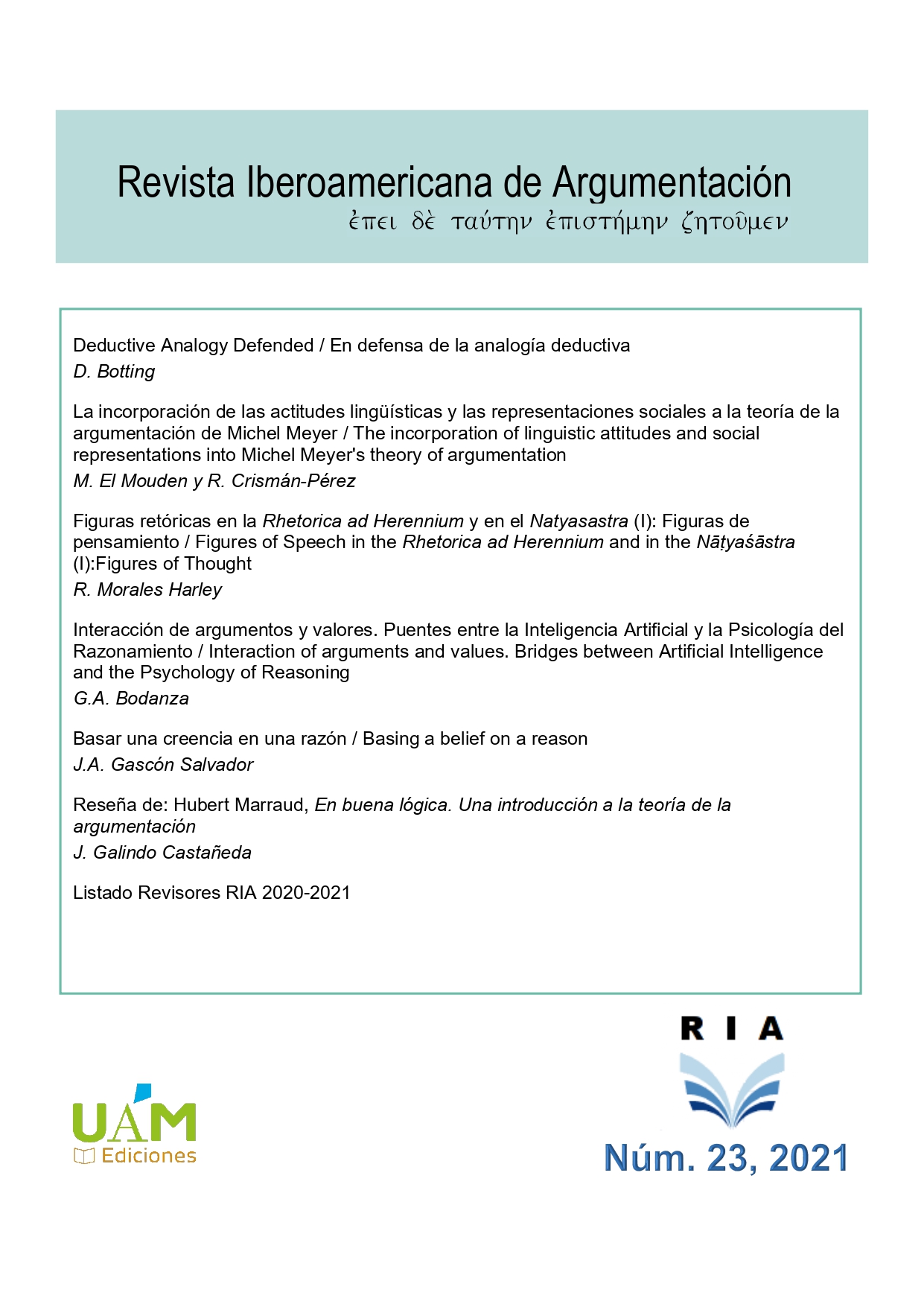Interaction of arguments and values. Bridges between Artificial Intelligence and the Psychology of Reasoning
Keywords:
abstract argumentation, value-based argumentation, Artificial Intelligence formal models of argumentation, psychology of reasoningAbstract
The argumentation models proposed from Artificial Intelligence offer simplicity and precision to analyze the acceptability of an argument in interaction with others. However, there are doubts when considering their correctness, since the character, more dialectical than logical, of the argumentation prevents having a formal semantics with which to relate it. Here we will discuss the value-based argumentation models by Gabbay and Bench-Capon. Gabbay, for instance, seeks to implement the intuition that confronting arguments that promote the same value (religious, political, legal, etc.) is more effective than doing it from a different, unshared value. Using some examples taken from the literature, I will show the importance of building bridges between the models and the empirical that enable to contrast such intuition. I will argue that there are both conceptual and representational problems that need to be addressed, and I will point out some lines of experimental research in these directions.
Downloads
References
Bench-Capon, T. J. M. (2002). “Agreeing to differ: modelling persuasive dialogue between parties with different values”. Informal Logic 22/3, 231-245.
Bench-Capon, T. J. M. (2002) “Persuasion in practical argument using value-based argumentation frameworks”. Journal of Logic and Computation 13(3), 429–448.
Bodanza, G. (2015). “La argumentación abstracta en Inteligencia Artificial: problemas de interpretación y adecuación de las semánticas para la toma de decisiones”. Theoria. An International Journal for Theory, History and Foundations of Science 30/3, 395-414. doi:https://doi.org/10.1387/theoria.13150
Dung, P. M. (1995). “On the acceptability of arguments and its fundamental role in nonmonotonic reasoning, logic programming and n-person games”. Artificial Intelligence 77/2, 321-357.
Esaiasson, P., Persson, M., Gilljam, M., y Lindholm, T. (2019). “Reconsidering the role of procedures for decision acceptance”. British Journal of Political Science 49/1, 291-314. https://doi.org/10.1017/S0007123416000508
Ford, M. (2005). “Human Nonmonotonic Reasoning: The Importance of Seeing the Logical Strength of Arguments”. Synthese 146/1/2, 71-92.
Ford, M., Billington, D. (2000). “Strategies in human nonmonotonic reasoning”. Computational Intelligence Journal 16/3, 446-468.
Gabbay, D. (2014). “Systems of interacting argumentation networks”. The IfCoLog Journal of Logics and their Applications 1/1, 131-176.
Kahneman, D., & Tversky, A. (2000). “Choices, values, and frames”. En D. Kahneman y A. Tversky (Eds.), Choices, Values, and Frames (pp. 1-16). Cambridge: Cambridge University Press. doi:10.1017/CBO9780511803475.002
Kraus, S., Lehmann, D., & Magidor, M. (1990). “Nonmonotonic reasoning, preferential models and cumulative logics”. Artificial Intelligence 44/1, 167-207. https://doi.org/10.1016/0004-3702(90)90101-5
McCarthy, J., y Hayes, P. J. (1969). “Some philosophical problems from the standpoint of Artificial Intelligence. En B. Meltzer & D. Michie (Eds.), Machine Intelligence 4 (pp. 463–502). Edinburgh University Press.
MacCoun, R. J., y Kerr, N. L. (1988). “Asymmetric influence in mock jury deliberation: Jurors’ bias for leniency”. Journal of Personality and Social Psychology 54/1, 21-33. https://doi.org/10.1037/0022-3514.54.1.21
McDermott, D. (1987). “A critique of pure reason”. Computational Intelligence 3/1, 151-160. https://doi.org/10.1111/j.1467-8640.1987.tb00183.x
Pelletier, F., & Elio, R. (2005). “The case for psychologism in default and inheritance reasoning”. Synthese 146/1/2), 7-35.
Perelman, Ch. y Olbrechts-Tyteca, L. (1989). Tratado de la argumentación. Nueva retórica. Madrid: Gredos.
Rahwan, Y., Madakkatel, M., Bonnefon, J-F., Awan, R., Abdallah, S. (2010). “Behavioral experiments for assessing the abstract argumentation semantics of reinstatement”, Cognitive Science 34/8, 1483-1502.
Schlechta, K. (1997). Nonmonotonic Logics: Basic Concepts, Results, and Techniques. Springer-Verlag. https://doi.org/10.1007/BFb0021104
Tversky, A, y Kahneman, D. (1981). "The framing of decisions and the psychology of choice". Science 211/4481, 453–58.
Wagensberg, J. (1994). Ideas sobre la complejidad del mundo (3ra. edic.). Barcelona: Tusquets Editores.
